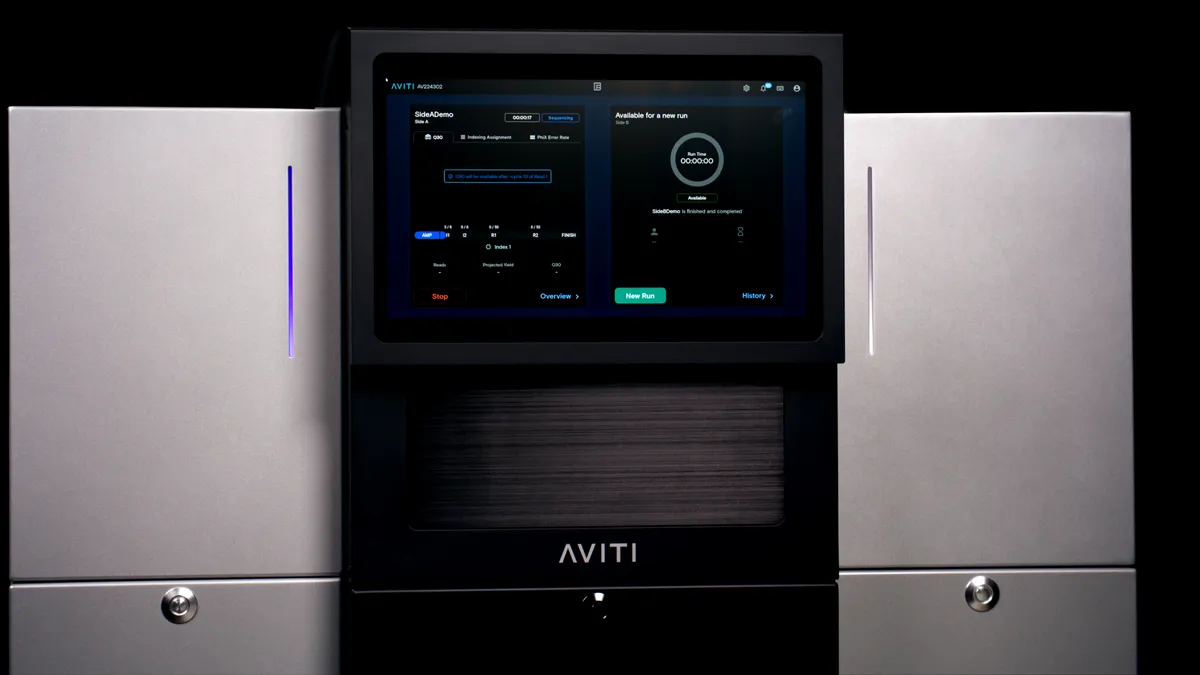Dive Brief:
- Element Biosciences said Wednesday it raised $277 million in a Series D financing round, giving the company additional capital to challenge Illumina in the sequencing market.
- The company launched a benchtop sequencer in 2022. Element claims companies that choose its Aviti device over Illumina’s rival Nextseq 2000 sequencer can save almost $1.5 million in three years.
- With a second device, Aviti24, available for preorder, Element has so far raised more than $680 million to support the commercialization of its products in a competitive market.
Dive Insight:
Illumina dominates the short-read sequencing market. While Pacific Biosciences and Oxford Nanopore Technologies have built businesses in the long-read space, no company seriously challenged Illumina in the short-read market for years. Short-read DNA sequencing can capture the majority of genetic variation, while the long-read technique allows for the detection of more complex structural variants.
In 2019, the U.K. competition watchdog estimated Illumina controlled 80% to 90% of the next-generation sequencing market, covering both short and long reads.
Element is one of the companies trying to challenge Illumina’s dominance. The startup established itself as a potential contender a few years ago, raising a $276 million Series C round in 2021 and launching its Aviti device the next year.
Aviti costs $289,000. Element compared Aviti’s costs to being given a Nextseq 2000 for free, calculating a user would break even in around six months and thereafter spend less than with Illumina because of reduced reagent costs. The technology lowers dye concentrations by 100-fold, Element claims, and the company has committed to not raising the price of reagents throughout the life of a user’s Aviti system.
Independent researchers have validated the platform. Scientists at the specialty lab Navigate Biopharma Services compared Aviti to Illumina’s Nextseq 2000 and Nextseq 550Dx platforms, finding that Aviti required “additional hands-on time” but generated cleaner data with “less [false positive] variants” than Illumina’s platforms.
Element began accepting preorders for its next device, Aviti24, earlier this year.
Wellington Management led the latest financing round. New and existing investors including Samsung Electronics, Fidelity and Foresite Capital also participated in the round. Element will use the money to build on its commercial progress, which has seen the Aviti install base increase from around 40 to more than 190 over the past year.
Element estimated Aviti accounted for 15% of total sales of mid-throughput sequencing instruments one year after it launched the device. Illumina cited mid-throughput shipments as a driver of the 29% drop in sequencing instrument revenue in the first quarter. An analyst asked Illumina about the mid-throughput market on the earnings call, questioning how rival devices with lower costs are affecting the company.
“Mid-throughput is clearly where there's more competitive activities than maybe other spaces. We are seeing that mostly in China still, but in the rest of the world there is also that,” Illumina CEO Jacob Thaysen said. “We will continue to innovate in this space. It's an area we will continue to compete in. We expect to fight for every market share point out there.”










